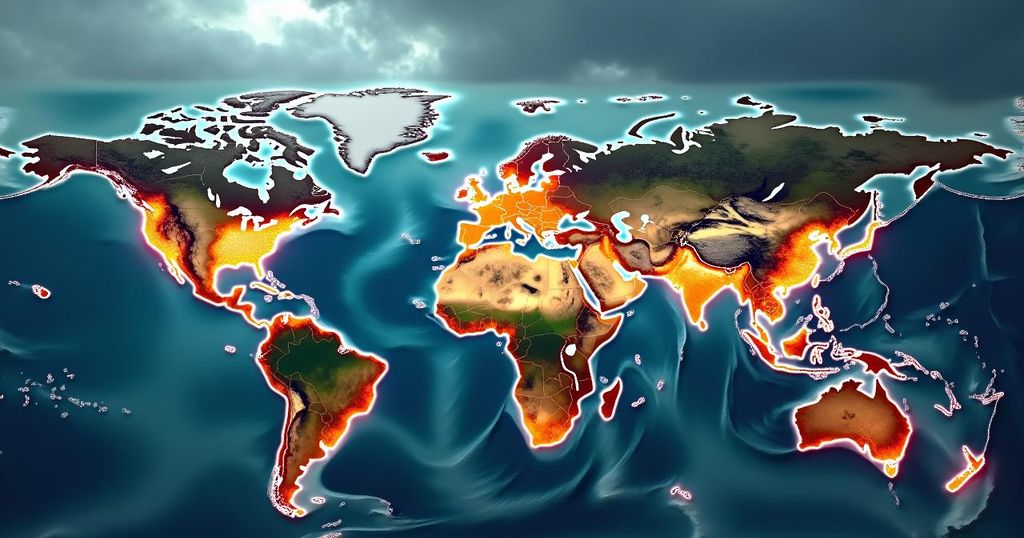The Impact of Climate Change on Hurricane Intensity: Insights from Helene and Milton

Recent scientific studies reveal that climate change has exacerbated the intensity and rainfall of Hurricane Helene, with expectations of similar outcomes for Hurricane Milton. Increases of approximately 10% in rainfall and 11% in wind speeds have been attributed to human-induced climate factors, prompting warnings from scientists regarding the future of hurricane activity and inland flooding risks in the context of global warming.
Recent studies indicate that anthropogenic climate change has significantly contributed to the intensity and precipitation associated with Hurricane Helene, resulting in an increase of approximately 10% in rainfall and an 11% rise in wind speeds. This assessment is critical as Hurricane Milton approaches the Florida coast soon after Helene’s catastrophic impact. According to findings from World Weather Attribution (WWA), the rising temperatures in the Gulf of Mexico, exceeding 3.6 degrees Fahrenheit (2 degrees Celsius) above average, heightened the conditions that fostered such devastating storms, making occurrences of high sea temperatures 200 to 500 times more probable. Ben Clarke, a climate researcher at Imperial College London and co-author of the study, highlights that warmer air can retain more moisture, exacerbating precipitation levels amidst already adverse conditions. Hurricane Helene inflicted severe damage, resulting in record high storm surges and catastrophic winds of up to 140 miles per hour. Tragically, the aftermath of Helene witnessed over 230 fatalities, largely due to unexpected inland flooding rather than direct winds. In total, the storm discharged more than 40 trillion gallons of rain across the affected regions. Forecasters suggest that Hurricane Milton may similarly experience intensified conditions due to ongoing climate change. The continual burning of fossil fuels is projected to produce increased frequencies of hurricanes that are not only destructive at coastal levels but also reach far inland, presenting unprecedented flood risks. Hurricanes like Helene, estimated to occur once every 130 years under previous conditions, are now more than twice as likely attributed to climate variability as a result of human activities. WWA’s methodologies leverage real-time climate attribution studies, providing timely insights into the inevitable link between climate change and severe weather patterns. Additionally, separate analyses conducted by experts from the Lawrence Berkeley National Lab further substantiate the assertion that climate change resulted in significantly heightened rainfall in regions affected by Helene. Experts underline the urgency for proactive measures in emergency preparedness and resilience planning as climate patterns evolve. The combined occurrences of Helene and Milton serve as a stark reminder of the need for strategic energy transitions away from fossil fuels to mitigate further climate impacts. When considering future storms, the trajectory of climate change remains a critical variable that can either exacerbate or alleviate the threats posed by hurricanes, depending on global energy policies and carbon emissions. As stated by Clarke, “As we go into the future and our results show this as well, we still have control over what trajectory this goes in as to what risks we face in the future, what costs we pay in the future.”
The article elucidates the correlation between climate change and the increasing frequency and intensity of hurricanes, particularly focusing on Hurricanes Helene and Milton, which have emerged in a short time frame. It draws attention to the alarming rates at which human-induced climate changes influence weather patterns, particularly the ability of warmer air to foster greater moisture retention in storm systems, thereby escalating rainfall significantly. Moreover, the WWA and other scientific bodies are actively attributing these heightened climate conditions to the oil and gas sectors that contribute to greenhouse gas emissions, emphasizing the imperative for sustainable energy practices in light of preceding extreme weather events.
In conclusion, the findings regarding Hurricanes Helene and Milton underscore the deep-seated impacts of human-driven climate change on severe weather patterns. With scientific evidence suggesting increased storm intensity and rainfall directly correlating to warmer ocean temperatures, it becomes critical for society to recognize the importance of shifting away from fossil fuel reliance. Future disaster preparedness must prioritize resilience strategies to address and manage the increasing risks posed by intensified storms and unprecedented flooding, as these phenomena become more frequent in a warming world.
Original Source: www.ksnt.com







